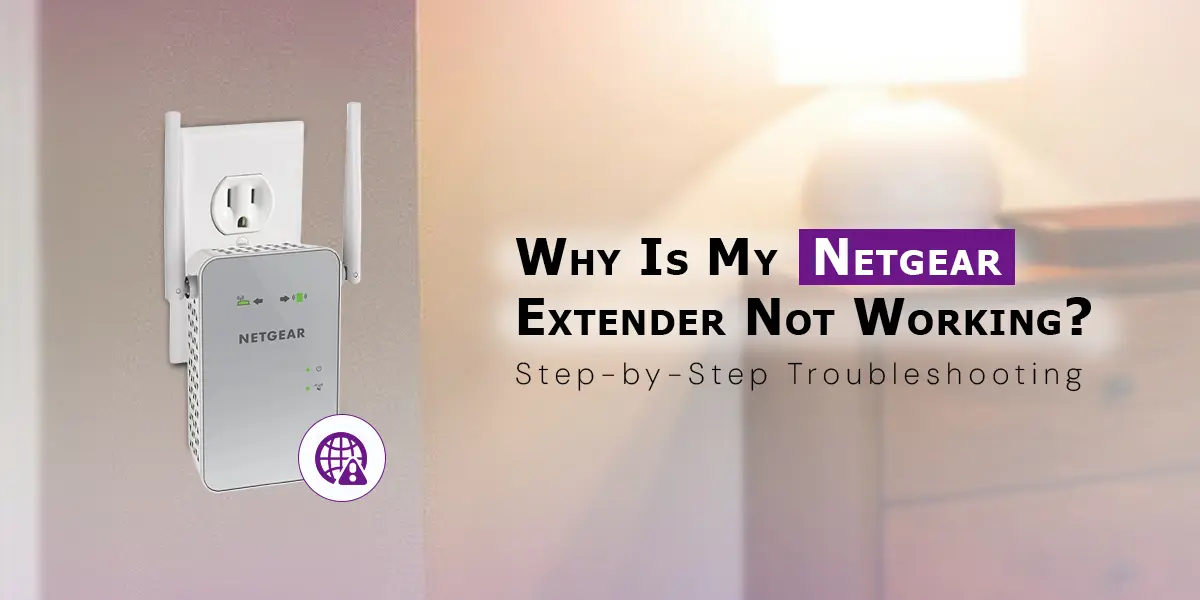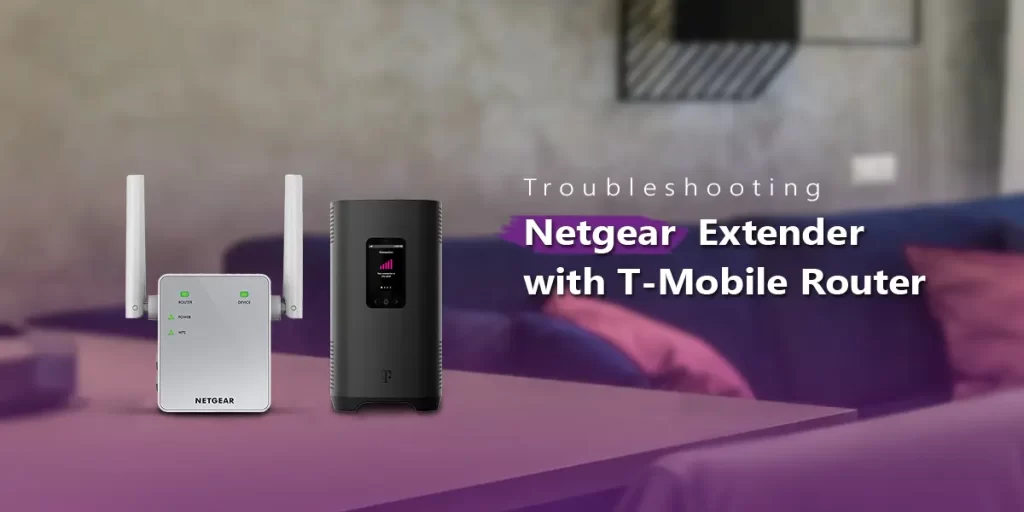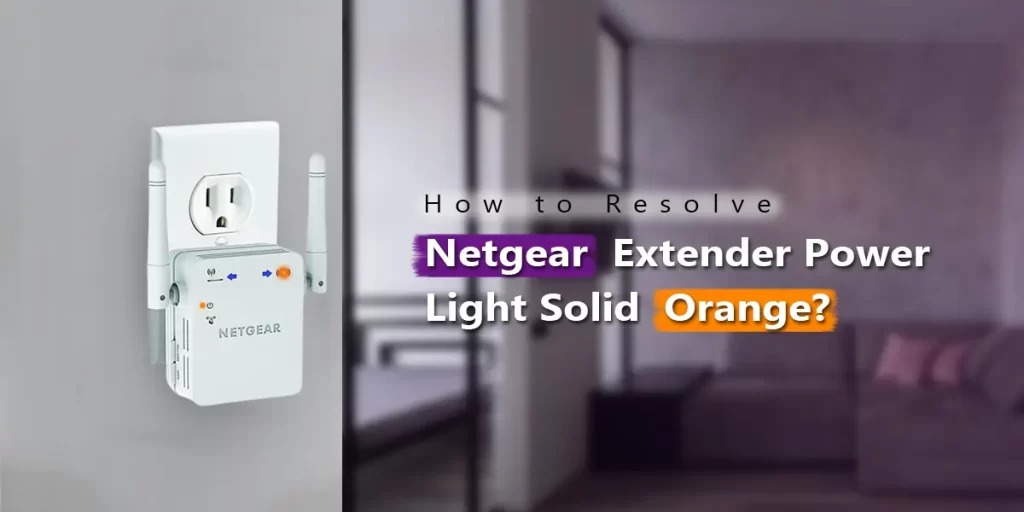
With the use of a Netgear Wi-Fi extender, you can increase the range of your wireless network and ensure that there are no dead zones in your house or place of business and that you always have uninterrupted internet access. Nevertheless, Netgear extenders can experience issues and cease to function as intended, just like any other piece of equipment. Similar issues are encountered by many customers, but the good news is that most of them are fixable with a little tinkering. We’ll look at the most frequent causes of your netgear extender not working in this blog post, along with simple troubleshooting methods to fix it.
Reasons and Solutions for Netgear Extender Not Working Issue
1. The extender was not positioned well
Poor placement is one of the most frequent causes of netgear wifi extenders not working as intended. An extender must be positioned between the router and the desired signal extender region at the ideal distance in order to maximize the Wi-Fi signal.
Resolution:
- The extender should be situated central amid the router and the wanted exposure zone.
- Verify that nothing big or thick is blocking the path between the extender and the router.
- The Wi-Fi signal may be interfered with by electrical equipment like microwaves and cordless phones, so keep the extender away from them.
2. Inaccurate Configuration for Setup
One of the most frequent problems with new extenders is that they might not be set up properly at first. Erroneous or inadequate settings may hinder the extender capability to start consistent linking with the primary router.
Resolution:
- Make sure you are adhering to the proper setup protocol. Netgear extenders are accompanied by comprehensive setup instructions that can be accessed using a web browser or the Netgear Nighthawk App.
- During the setup process, confirm that you are connecting to the correct network.
- Try redoing the setup procedure and resetting the extender if you’ve finished the setup but it’s still the netgear extender not working.
3. Poor Wi-Fi reception from the primary router
The intensity of the Wi-Fi signal your Netgear extender receives from your router has a big impact on how well it works. The extender’s ability to strengthen the network will be limited if the router’s signal is poor.
Resolution:
- Connecting a gadget, such as a laptop or phone, to the nearby Wi-Fi network will allow you to see how strong the signal is. Move the extender closer to the router if the signal is poor.
- Make sure there are no problems with your router itself as well. Check to see whether the Wi-Fi performance has improved after restarting your router.
4. Firmware Problems
Another frequent cause of a netgear extender not working or malfunctioning is outdated firmware. Firmware upgrades from Netgear are routinely released to resolve security flaws, correct problems, and enhance device performance.
Resolution:
- To find out if your model has a firmware update available, visit the Netgear support website.
- If there is an update prompt, you may also check by logging into the web interface of the extender. To upgrade your extender, follow the on-screen directions when an update becomes available.
5. The extender is not connecting to the router
Your extender may not be connected to your primary router if it is switched on and the network name (SSID) or Wi-Fi password is entered incorrectly.
Resolution:
- Verify that the password and SSID you specified during setup exactly correspond to those on your router.
- Check the router’s settings again, especially if you’ve recently updated the SSID or network password.
- Update the extender’s settings to reflect any changes made to the main network.
6. Device Interference and Channel Overlap
Wi-Fi networks utilize particular channels for operation, and interference from adjacent networks or devices using the same channel might lead to problems with performance. It is possible that electrical equipment or other Wi-Fi networks are interfering with your Netgear extender.
Resolution:
- Go into the settings of your router and find out which channel is being used by your Wi-Fi network. The majority of routers choose their channels automatically by default, although occasionally choosing a less busy channel by hand might enhance speed.
- To find overloaded channels and move your router to a less popular one, use a Wi-Fi analyzer program.
- Make sure your extender is not positioned next to anything that might disrupt the Wi-Fi signal.
7. An excessive number of gadgets
Similar to routers, connected extenders have a maximum number of devices they can efficiently handle. If your extender has too many devices connected to it, it might get overloaded which results in netgear extender not working or slow down.
Resolution:
- To lighten the burden, unplug any extraneous devices from the extender.
- Upgrade to a mesh network system or more potent extender if you have a large number of devices that require Wi-Fi connectivity. These systems can manage multiple connections.
8. Bandwidth constraints or network congestion
Issues with both the router and netgear wifi range extender not working may arise if a lot of devices are connected at once and your primary network has limited bandwidth.
Resolution:
- Restrict the amount of concurrent high-bandwidth activities on the network, such as gaming and streaming.
- Consider purchasing a router and extender system that enables faster speeds and more capacity, or upgrade your internet package.
9. Inaccurate IP Address Setup
Sometimes the IP address setup is the source of the netgear extender not working. If there’s a disagreement between the extender and the primary router over IP addresses, it might result in network troubles.
Resolution:
- In the event that you are not utilizing a static IP setup, make sure your extender is configured to automatically get an IP address (DHCP mode).
- Check your netgear extender login details as well.
- To check for IP address conflicts or issues, check the network settings in the admin panel of the extender.
10. Hardware Error
Hardware issues are rare, but they might make netgear extender not working. This can be the outcome of core constituent fiasco or flaw in device.
Resolution:
- Get in touch with netgear support for replacement choices or troubleshooting if you think there may be hardware problems.
- In the event that your extender breaks, see if it’s still covered under warranty for a possible replacement.
Final thoughts
Don’t panic if your netgear extender not working! In most circumstances, the issue may be fixed by easy troubleshooting methods. Make sure your extender is positioned correctly and linked to your router first.

